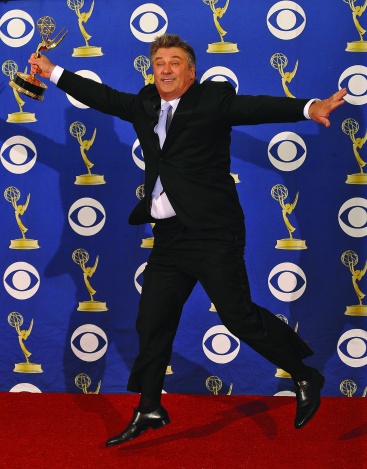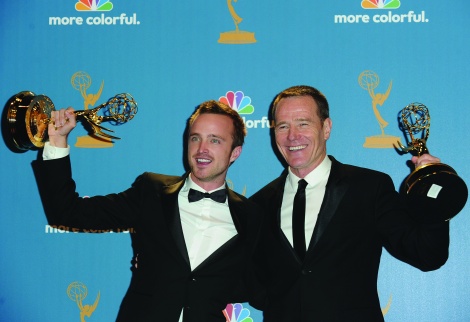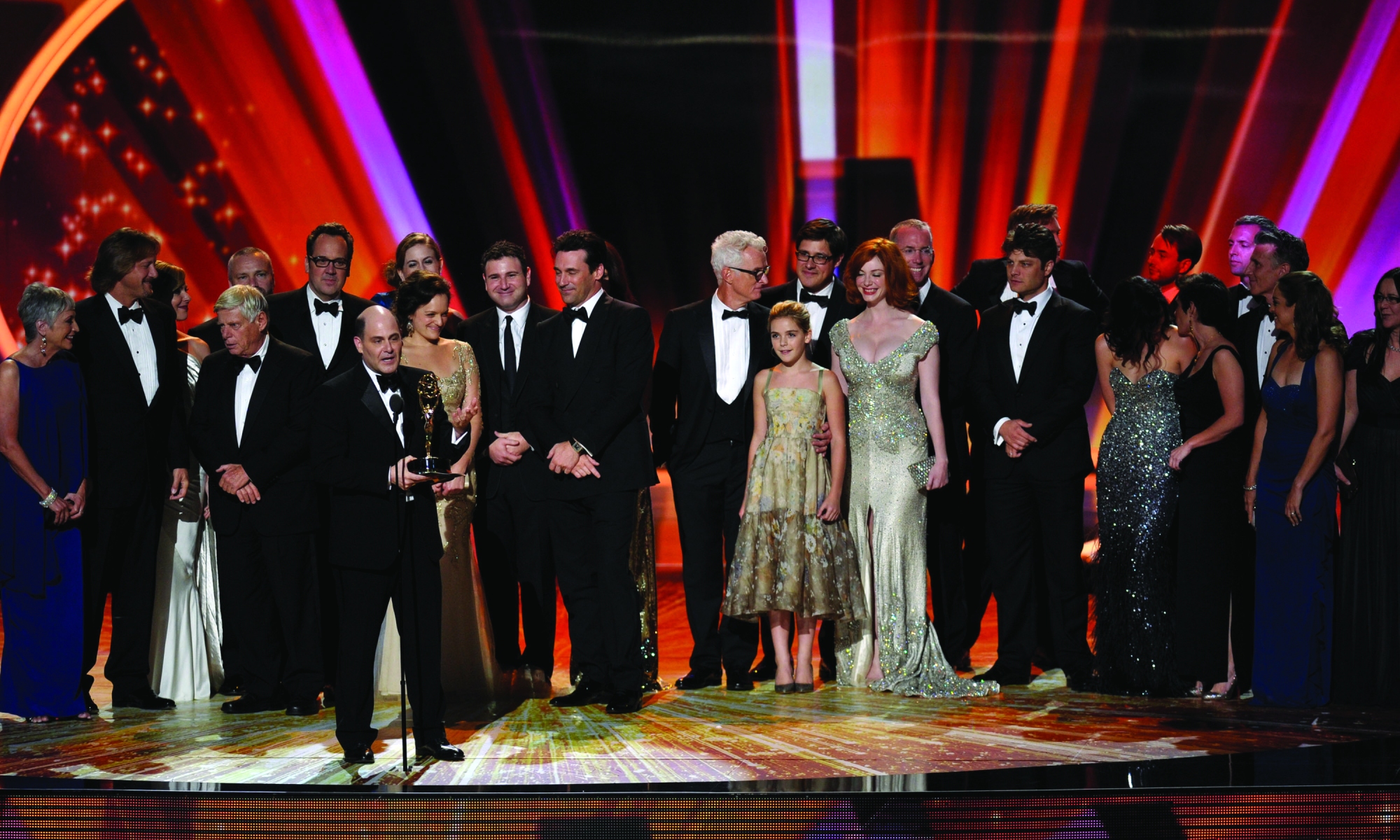Ray Richmond is an AwardsLine contributor. This story appeared in the June 12 issue of AwardsLine.
When Homeland took home the three biggest drama series honors at last year’s Emmy Awards—for top drama as well as lead actor (Damian Lewis) and actress (Claire Danes)—it proved a watershed moment for Showtime after a couple of decades spent laboring in the awards-night shadow of HBO. “It meant that we had a claim on excellence,” confirms David Nevins, Showtime’s president of entertainment. “I mean, it’s always nice to be invited to the party. And for one night, it’s also nice to be king.”
But what does being king really mean in the Emmy context? It’s a question that has often been asked and perhaps never definitively answered. In the eight months since the Homeland gold rush, Nevins says that Showtime’s subscriber base has continued to grow, and the network’s credibility with the Hollywood creative community continues to soar. The win also helped raise Homeland’s profile during its second season, with Nevins noting that its viewership rose 25% year over year and grew to become the highest-rated series Showtime has ever had. “It’s made us a place to bring your best projects and best actors,” he finds. “It’s told the acting community that Showtime is where you can go to win awards and augment your career—even if you’re an established film actor.”
But in truth, the tangible impact of the Emmy triumphs is best measured over the long haul, Nevins believes. “It’s more of a slow-and-steady, building-of-the-brand thing rather than overnight,” he says. “We’re still hoping that the momentum halo from the wins spreads through the rest of our schedule.”
To a film or individual, the value of winning an Oscar, or even just earning an Oscar nomination, is generally undisputed. More often than not, it’s a career-maker that elevates one into rarefied air that typically translates into money at the boxoffice and beyond. The value of an Emmy Award? Not quite so clear. It affixes a seal of quality onto a person or project, to be sure. But that doesn’t necessarily guarantee a bounce beyond Emmy Night itself.
Consider the case of Arrested Development, which returned May 26 with 15 brand new episodes on Netflix, but enjoyed a woefully short life on Fox in the decade before. It was the toast of the industry in winning five Emmys in 2004, including for outstanding comedy series. But the honors did little to boost the show’s ratings, and it was gone by 2006.
 Then there is the example of NBC’s 30 Rock. Like Arrested Development, it won numerous Emmys its first season, including for top comedy. And it too found that Emmys don’t necessarily translate into viewership, retaining a small cult following rather than a mass one. Yet the Tina Fey-Alec Baldwin comedy just left the air this year on its own terms after seven seasons. One of the show’s exec producers and showrunners, Robert Carlock, believes, “That first Emmy might have kept us on the air for seven years. I have to think that it definitely made it harder for NBC to cancel us.”
Then there is the example of NBC’s 30 Rock. Like Arrested Development, it won numerous Emmys its first season, including for top comedy. And it too found that Emmys don’t necessarily translate into viewership, retaining a small cult following rather than a mass one. Yet the Tina Fey-Alec Baldwin comedy just left the air this year on its own terms after seven seasons. One of the show’s exec producers and showrunners, Robert Carlock, believes, “That first Emmy might have kept us on the air for seven years. I have to think that it definitely made it harder for NBC to cancel us.”
It also couldn’t have hurt that NBC didn’t have many ratings juggernauts on its schedule during those years, or that 30 Rock would go on to earn 14 Emmy statuettes in its first three years (including three straight best comedy series honors). “All of those Emmys, for the show and for Tina and for Alec, certainly helped make it a signature show for NBC,” agrees Richard Licata, the network’s exec vp of communications and a veteran of Emmy campaigns going back a quarter-century.
Licata doesn’t necessarily think it’s so much the winning as the campaigning for Emmys that ultimately bears the greatest value, as he has found in mounting campaigns for HBO, Fox, FX, Showtime and NBC over the years. “The campaigning itself is a great branding opportunity for a network or for an actor,” Licata says. “I think as the TV landscape becomes so voluminous, it has great value in casting a spotlight. And then when you win, as a performer, it certainly translates into thousands of new Twitter and Instagram and Facebook followers.”
The significance of Emmy attention on a cable network’s embryonic original production output likewise can’t be minimized, Licata explains. He was helping out on the campaign for The Shield back in 2002, in the early days of FX’s foray into homegrown drama programming. When star Michael Chiklis won that year for lead actor in a drama, Licata remembers, “It really put FX on the map and served notice that it was in the game. The same went for USA Network when Tony Shalhoub won for Monk. The Emmy attention itself helps turn series into signature shows.”
Charlie Collier, president and general manager at AMC, has witnessed the phenomenon firsthand. His network was mostly populated by theatrical acquisitions until it ramped up its original series production, gaining immediate Emmy traction beginning in 2008 with the likes of Mad Men, Breaking Bad, The Killing and The Walking Dead. The goal from the beginning, he says, was to “create iconic series that could stand side by side with some of the greatest films of all time.”

All of the Emmy attention that AMC’s series has received—including four straight top drama series wins for Mad Men and a combined five triumphs for Breaking Bad regulars Bryan Cranston and Aaron Paul—has been “great for our brand in a number of ways,” Collier confirms. “It’s been a real calling card with the creative community. They’ve seen that we’ll invest in projects of quality and take creative risks in terms of storytelling and casting. The Emmys have done a lot to draw attention to that.”
Few series in Emmy history have generated more nominations for a more diverse number of performers than has NBC’s Law & Order: SVU in its first 13 seasons of eligibility. It has earned noms for 18 different performers, from leads Mariska Hargitay and Christopher Meloni to a rich roster of guest stars including Robin Williams, Carol Burnett, Angela Lansbury and Marcia Gay Harden—plus wins for Hargitay (2006), Amanda Plummer (2005), Leslie Caron (2007), Cynthia Nixon (2008), Ellen Burstyn (2009) and Ann-Margret (2010). If it was stunt-casting designed to get Emmys, it worked.
But longtime Law & Order: SVU exec producer Neal Baer, who is now heading up the CBS summertime drama Under the Dome that premieres June 24, believes that the show’s Emmy attention that began with a nomination for Hargitay in 2004 was responsible in part for attracting big-name guest stars to SVU. “I think it was kind of a pronouncement that we did something right,” Baer maintains. “Once word got around that we were this Emmy-quality show, we started to have access to the best stars around. We got a lot of people who won’t typically do TV. And I think it was all of the Emmy buzz we got on ER that led to a movie star like Sally Field to do our show.”
While it’s difficult to find a direct link between winning an Emmy and financial gain for an individual, it’s perhaps easier to assess a win’s impact on a series. If an Emmy helps a series to stay on the air, it leads to packaging and releasing full-season DVDs. “And the longer a series stays on the air,” Licata points out, “the longer you can package DVDs and make that money. It also helps lead to international sales.”
Of course, writers or performers involved in an Emmy victory don’t necessarily see a lot of that money. Cary Hoffman is a personal manager for two clients who have won Emmys: Mike Royce, who earned a pair of trophies (in 2003 and 2005) as producer on Everybody Loves Raymond; and Rules of Engagement creator Tom Hertz, who won as a member of the writing staff of Dennis Miller Live in 1996. “The Emmy is definitely worth more to a show than it is to the individual,” Hoffman finds. “The network or studio can bill something going forward as ‘an Emmy-winning show.’ But I’m not sure it carries the same weight to be an ‘Emmy-winning writer’ or ‘Emmy-winning producer.’”
But the value of an Emmy is often more about building overall brand cachet rather than quantifiable return. One documentary producer who has worked with HBO stresses that the network uses its doc unit specifically for brand support “because it’s not a profit center.”
Yet even if a series tanks after receiving so much Emmy love, as Arrested Development did, perhaps the show wouldn’t have been reborn this year on Netflix had the awards not helped draw attention its way nine years ago. As one writer observes, “A lot of great shows simply disappear because the audience didn’t embrace them. So maybe all of those Emmys helped to buy Arrested Development one improbable rebirth. That, and of course all of the rabid fans who have never been able to let the show go.”

